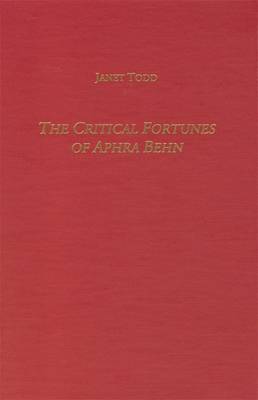
- Retrait gratuit dans votre magasin Club
- 7.000.000 titres dans notre catalogue
- Payer en toute sécurité
- Toujours un magasin près de chez vous
- Retrait gratuit dans votre magasin Club
- 7.000.0000 titres dans notre catalogue
- Payer en toute sécurité
- Toujours un magasin près de chez vous
Description
This is the first study of the posthumous life of Aphra Behn, the extraordinary vicissitudes of her critical reception, and the personal vilifications of her reputation through three centuries. Beginning with the reception of Behn's work during her lifetime, which she herself helped to orchestrate by performing herself as a seductive woman, a beleaguered lady writer, and a serious intellectual, among other roles, the work ends with the late 20th-century reception of Behn, when the interest in gender, race, and class has made of her almost a postmodern writer. In the 17th century she was seen as a playwright of sexy and propagandist comedies, and attacked by those who disapproved her supposedly unfeminine stance and her royalist politics. Later, as the Restoration period itself fell into disrepute, Behn's plays were denigrated along with those of her fellow men, but greater opprobrium fell on her as a woman, because in the 19th century it was felt that a female writer should have higher morals than a man. During this period, Behn's reputation was exceedingly low, while her short story Oroonoko gained acclaim, freed from any association with its author or her supposedly squalid times. In the 18th and 19th centuries Oroonoko moved from being viewed as political commentary and heroic romance to a sentimental tale of doomed love and then an abolitionist text. In the early twentieth century it was hailed as one of the earliest realist texts, part of the great English ascent into the novel.
JANET TODD is professor of English at the University of East Anglia
JANET TODD is professor of English at the University of East Anglia
Spécifications
Parties prenantes
- Auteur(s) :
- Editeur:
Contenu
- Nombre de pages :
- 200
- Langue:
- Anglais
- Collection :
- Tome:
- n° 16
Caractéristiques
- EAN:
- 9781571131652
- Date de parution :
- 01-06-98
- Format:
- Livre relié
- Format numérique:
- Genaaid
- Dimensions :
- 168 mm x 230 mm
- Poids :
- 426 g

Les avis
Nous publions uniquement les avis qui respectent les conditions requises. Consultez nos conditions pour les avis.






